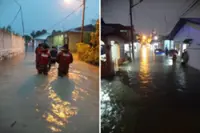
KUALA LUMPUR: Malaysia needs a staggering RM392bil allocation for flood mitigation projects but with limited resources, the government will prioritise implementation based on urgency and needs, says Deputy Prime Minister II Datuk Seri Fadillah Yusof.
Fadillah, who is also Energy Transition and Water Transformation Minister, said the Irrigation and Drainage Department (DID) had studied major river basins as part of a long-term solution to addressing flooding woes.
"Based on these studies, flood risk by region from 2023 to 2100 estimates that an allocation of RM392bil is needed to implement 365 mitigation projects.
"If we were to spend that amount in a year, we would not have enough budget for other ministries.
"That is why we implement projects based on needs," he told V. Ganabatirau (PH-Klang) during the Minister's Question Time in the Dewan Rakyat on Thursday (Dec 5).
Ganabatirau had asked if the government was satisfied with the flood mitigation projects and measures so far to improve flood preparedness.
Fadillah said his ministry, via the DID, has identified causes of flooding across the country.
"They include a significant increase in rainfall due to climate change, inadequate drainage systems, and rapid uncontrolled development and land use.
"Additionally, issues such as waste disposal and damaged drainage infrastructure have contributed to flooding, particularly flash floods.
"Whether or not the government is satisfied, flood management requires integrated cooperation, especially in managing drainage systems and rivers involving various departments and agencies," Fadillah said.
Citing the SMART Tunnel Project in Kuala Lumpur, which has been operational since 2007 at a cost of RM1.97bil, he said his ministry was satisfied with its implementation.
"Over 17 years of operation, the tunnel has been activated more than 600 times to divert floodwater and has successfully reduced flooding risk in the city centre.
"According to a DID study, total economic losses avoided thanks to flood diversion amounted to over RM4.3bil," he said.
Fadillah added that DID has also identified 4,619 flood hotspots nationwide.
"Initial measures have been taken to implement mitigation works such as maintaining drainage systems, repairs, retrofitting, and so forth, as well as early warning systems.
"This includes ensuring that 534 flood warning sirens along major rivers are functioning effectively," he said.
In terms of disaster response, each state and district disaster management committee hd been instructed to coordinate early preparations through meetings, simulations and drills, preparing temporary relief centres, and implementing communication, education and public awareness (Cepa) activities, among others, he added.
For post-flood coordination, preparations were in place for immediate assistance, clean-up works and other forms of aid to victims, including infrastructure repairs.
"This also includes strengthening cooperation between agencies, NGOs and volunteers in coordinating aid distribution," Fadillah said.










































